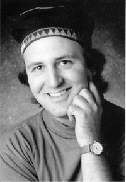Berssenbrugge & Nichol: POETRY PHYSICAL PLEASURE 2
Years ago (1988) I attended a poetry reading that in a single hour displayed the widest range of poetry as physical pleasure that I have ever witnessed. It was at the Tucson Poetry Festival. First Mei-mei Berssenbrugge whispered a poem, much like the following, from “The Retired Architect.”
I tried to complete a life circumstance like a building, loose in space on used land.Consider the length of the line here, with all lines not fitting without break within this blog frame. To speak through the line as a single, continuous, unbroken utterance, it must be uttered softly, preserving the breath. In Berssenbrugge’s voice it becomes very nearly a whisper; in anyone’s voice it would be something close to that. Such a reading also recognizes the contemplative nature of the work, its existence as thought perhaps more than as speech. Imagine yourself in a room alone, savoring the articulation of serious matter, wanting a single reader not so much to understand herself as recipient of an address, rather to overhear thought, with both speaker and listener barely noticed. The pleasure here is delicate, helping to create a spiritual space that might be located in time on a cool spring morning and in space looking at the long horizon of the New Mexico desert—that long line of space informing and responding to the long line of the poem and the long line of the time of the poem. Nothing tricky about the physical act of pronunciation here, yet it demands a great deal of care, patience, stillness. In a culture of rushing to a never-ending line of appointments, such calm may be a superior pleasure.
I made a shape against sky on flat land like a cut in the weeds, but I got bored and didn't finish.
Concrete surfaces need support, and my illness made calculations difficult, shadows fell like hinges on erasures.
This site is riddled with plastic wood panelling, plastic ducks and discarded coach lamps.
The iconography doesn't ethically correspond to its cut up and eroded state.
I make something which as it changes and falls apart, offers no clues to itself before, as if all shots were mobility frames.
Following Berssenbrugge, bpNichol came on stage, with noticeable difficulty in moving (he was in considerable pain from a tumor at the base of his spine, which eventually would lead to his death in September 1988), sat at a table, began tapping the table with his palm in a rhythm, and performed the sound poem, "pome poem” (full text on Crag Hill's terrific blog) that takes us on an anatomical tour of the body, beginning
What is a poem is inside of your body, body, body, body?The lines are sung rather than spoken: a chant-like song that elongates and rounds (practice going down in tone and then up again to complete the sound of the word) the initial word of each line and then speeds toward a persistent stress on the words “body” and “head” in their respective lines. The stresses are different—“body” moves up the scale a few places in a lilting tone while “head” comes down about a half octave in tone like a blunt force.
What is a poem is inside of your head, inside your head, inside your head, inside your head?
What is a poem is inside of your fingers, fingers, fingers, fingers?As the poem continues in pairs of line, the pattern repeats. Once heard, an audience wants to sing along in pleasure and contemplation of the connection of poem to body, of the production and reception of sound as physical fact. The poem is not too long to lose the effect, but long enough to develop its centrifugal pull, until it ends with
What is a poem is inside of your toes, inside your toes, inside your toes, inside your toes?
What is a poem is inside of your breathing, breathing, breathing, breathing, . . .with the final word repeating, without taking any further breath, gradually softening until one’s lungs are empty, having issued the poem into the world with all that one has to give. Inspiration ends in exhalation. Oddly inspiring that both the Berssenbrugge poem and the Nichol poem, incredibly different in voice, tone, subject, loudness, form (in all ways), end in the same place, a quiet breathlessness that honors the place of the poem as rhythmic speech act.


3 Comments:
Lovely post. I like the way this post associates a breath-oriented poetry with quietness. This makes sense, because quietness preserves and lengthens the breath, as you say. . . but it's interesting that the usual association with breath-oriented poetics is something grand and declamatory, like for Olsen the advantage of focusing on breath is that it can all be used, expended, at once, whenever he pleases. . .
By the way, have you seen my review of some of your books in the New Review of Literature yet? It's under Standard Schaeffer's name, due to a snafu. . .
Keep on publishing the good stuff!
Thanks, Stan
I am going to look for those reviews!
I sent two books to press in the past week, with three more going within the next week. Busy times.
Hey Charles,
You probably won't read this because it's a very belated thanks for this inspiring post. What you wrote re-members the poem, restores a primal connection. If a poem is intimacy, no one I've ever heard voices this more utterly than Mei Mei. I heard Dan Waber perform the bpNichol piece and was blown away. I still live in my mind, though my body has insists on reminding me that it's keeping a sullen watch over my work.
Peace,
Heather Thomas
Post a Comment
<< Home